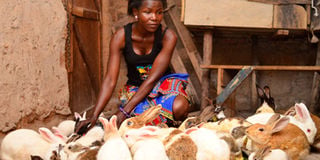School savings helped her start rabbit business

Blessed Grace Aleng feeds rabbits from which she makes an average income of Shs500,000 a month. Photo BY D. BUKENYA.
What you need to know:
With her pocket money savings of Shs380,000, she bought five rabbits.
Kampala
You have been a student, received some pocket money from either your parents or well-wishers at school. But how did you spend this money?
For Blessed Grace Aleng, a resident in Kireka, Kampala, rabbit keeping is her source of income. She had only heard that rabbit meat is tasty until she visited her grandmother in Nebbi District in February. She couldn’t agree more. That delicacy was later to become her farming business idea.
First, she surveyed shops and supermarkets to find out whether there was any selling the rabbit meat. There was none. Aleng then approached her auntie who has mothered her since 2002, to give her space to rear rabbits.
It was granted. Using her pocket money savings from high school of Shs380,000, she bought five rabbits- a male at Shs60, 000 and four female rabbits at Shs150, 000.
As a student at Namugongo Secondary and Vocational school, Jjanda, she had acquired entrepreneurial skills on how to start and improve business from Educate! Uganda. These skills were translated into a farming business in May.
“Rabbit meat is delicious. If you tasted it today, you wouldn’t want to live another day without eating it. I tested it when I visited my grandmother and that is how I came up with an idea to start rearing rabbits in Kampala and make meat and sausages from their meat,” Aleng shared.
Aleng now boosts of more than 70 rabbits in less than four months. She spends between Shs3,000 to Shs10,000 depending on what she buys. For instance, on cabbage peels, she spends Shs3,000 but if she adds carrots, shrubs/grass collected/picked around Namboole Stadium, it takes her up to Shs10,000.
She is now training in processing and packaging skills at Uganda Industrial Research Institute in order to be competitive on the job market.
But because she doesn’t have enough rabbits on her farm, Aleng collects rabbits from other farmers in villages for meat processing. The meat is then packaged under Tokibits before it is supplied to supermarkets and restaurants. A kilo of rabbit meat costs Shs17,000. Aleng employs five people to help her on the farm.
“My pocket money from ‘A’ level helped me start the business. There is vast potential in the market. I appeal to the public to begin eating rabbit meat because it is healthy,” Ms Aleng said.
Market
Residents around Kireka buy her products in addition to moving from shop to shop. She now earns Shs520,000 per month in profits and is looking for Shs7 million to expand her business and create more jobs for the youth.
Aleng was admitted for a diploma in International Business at Makerere University Business School but could not report in August because she doesn’t have the Shs1.2 million tuition fee. She hopes that when her business grows, she can find money to fund her higher education.
Benefits of rabbit meat
According to Veterinary doctor Roberto Omara, rabbit meat is the best white meat on the market compared to beef and pork because it has a high percentage of easily digestable protein and contains the least amount of fat.
“Rabbit meat has less calorie value than other meats. The sodium content of rabbit meat is comparatively lower than other meats. The calcium and phosphorus contents responsible for bone development are more in rabbit meat than any other meats,” Dr Omara explained. He added that they are the most productive domestic livestock animals producing six pounds of meat with the same feed and water while the cow will produce one pound of meat with the same feed and water.
About rabbit gestation
The gestational period of a rabbit is between 28 to 31 days (from the time of breeding to the birth of the litter). It takes six to eight months for a female rabbit to reach puberty and can become pregnant immediately while a male rabbit reaches its puberty around five to six months.




